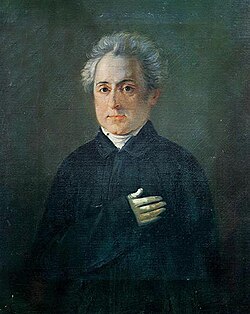This article needs additional citations for verification. (May 2021) |
Dionysios Solomos | |
|---|---|
 | |
| Native name | Διονύσιος Σολωμός |
| Born | 8 April 1798 Zakynthos, Département de la Mer-Égée (modern-day Greece) |
| Died | 9 February 1857 (aged 58) Kerkyra, United States of the Ionian Islands (modern-day Greece) |
| Occupation | Poet |
| Language | Greek, Italian |
| Nationality | Greek |
| Education | University of Pavia (LL.B., 1817) |
| Notable awards | Gold Cross of the Redeemer 1849 |
| Signature | |

Dionysios Solomos (/ˈsɒləmɒs/; Greek: Διονύσιος Σολωμός [ði.oniˈsios soloˈmos]; 8 April 1798 – 9 February 1857) was a Greek poet from Zakynthos, who is considered to be Greece's national poet. He is best known for writing the Hymn to Liberty (Greek: Ὕμνος εἰς τὴν Ἐλευθερίαν, Ýmnos eis tīn Eleutherían), which was set to music by Nikolaos Mantzaros and became the Greek and Cypriot national anthem in 1865 and 1966 respectively. He was the central figure of the Heptanese School of poetry. He is considered the national poet of Greece, not only because he wrote the national anthem, but also because he contributed to the preservation of earlier poetic tradition and highlighted its usefulness to modern literature. Other notable poems include Ὁ Κρητικός (The Cretan), Ἐλεύθεροι Πολιορκημένοι (The Free Besieged). A characteristic of his work is that no poem except the Hymn to Liberty was completed, and almost nothing was published during his lifetime.
[1] He lived in Corfu-Town between 1832–1857, his house you can see there from the outside.